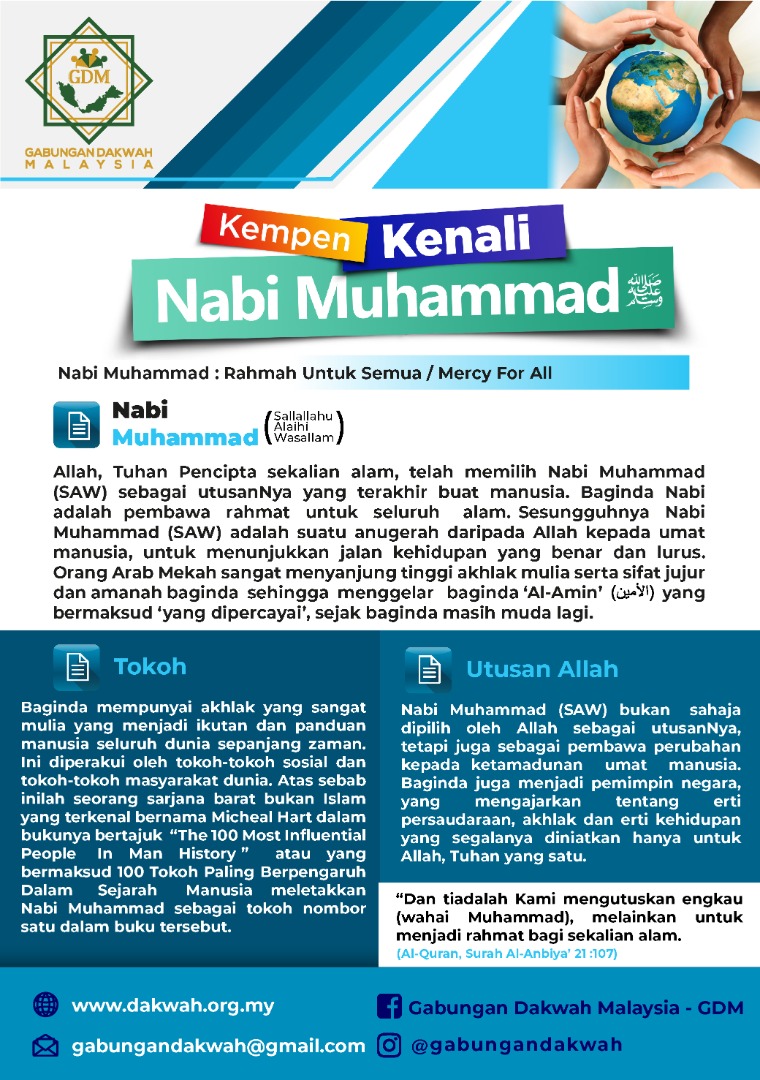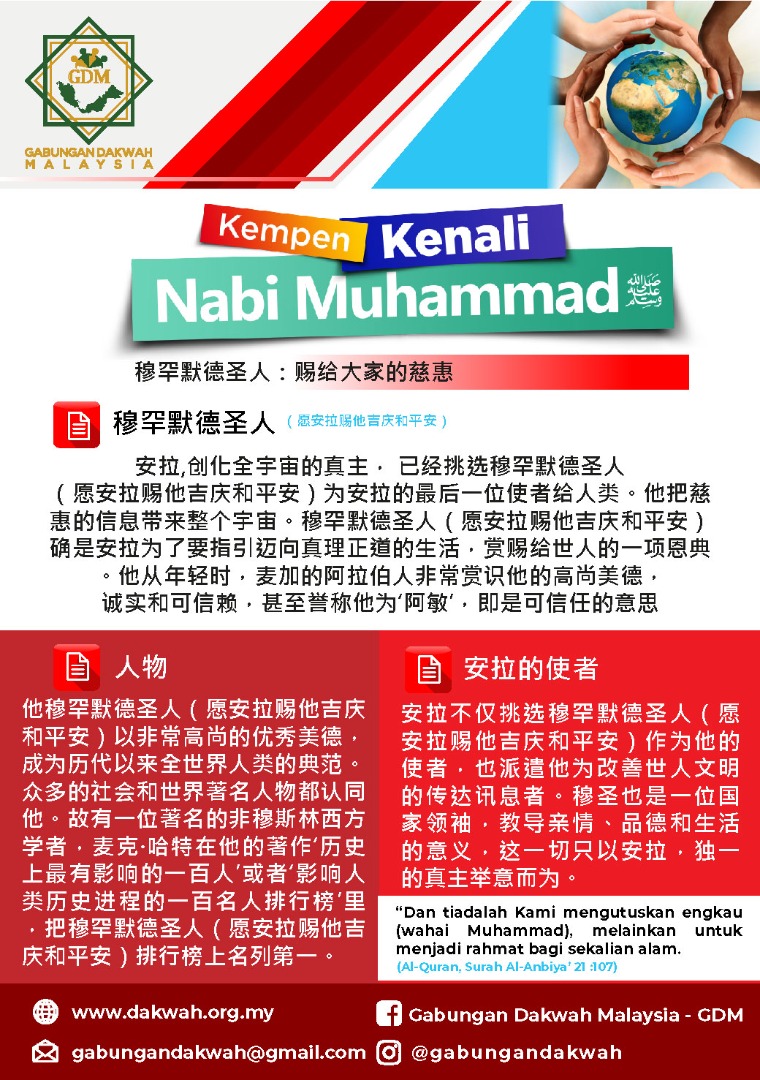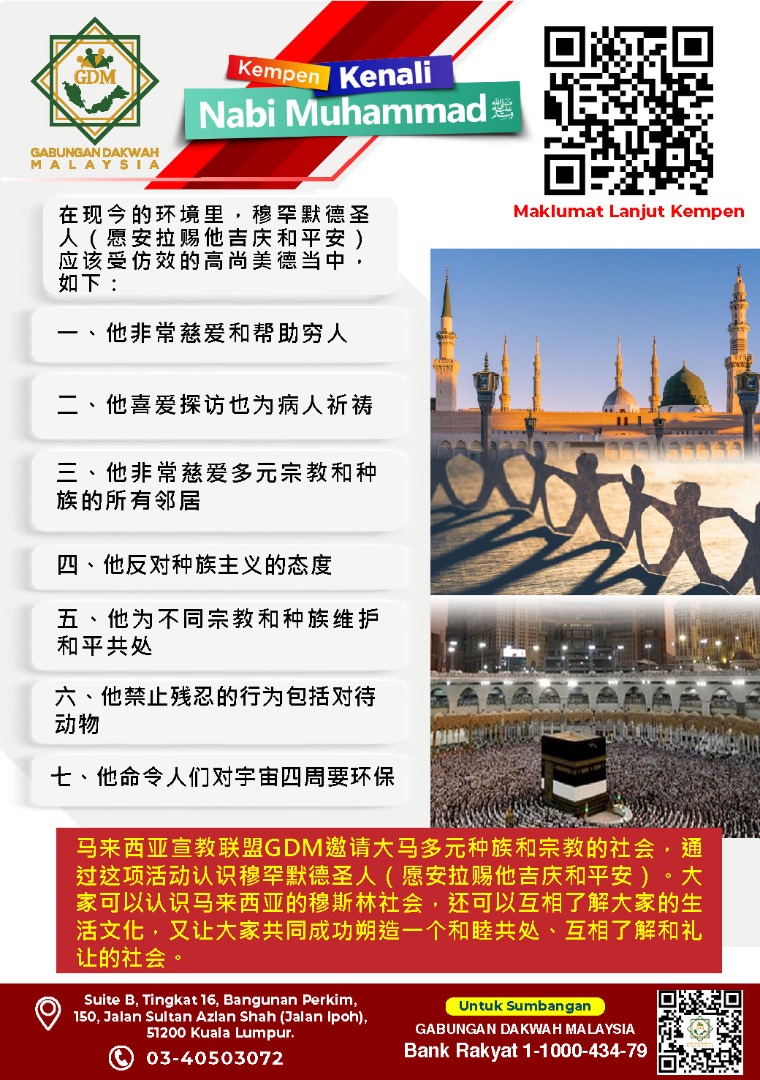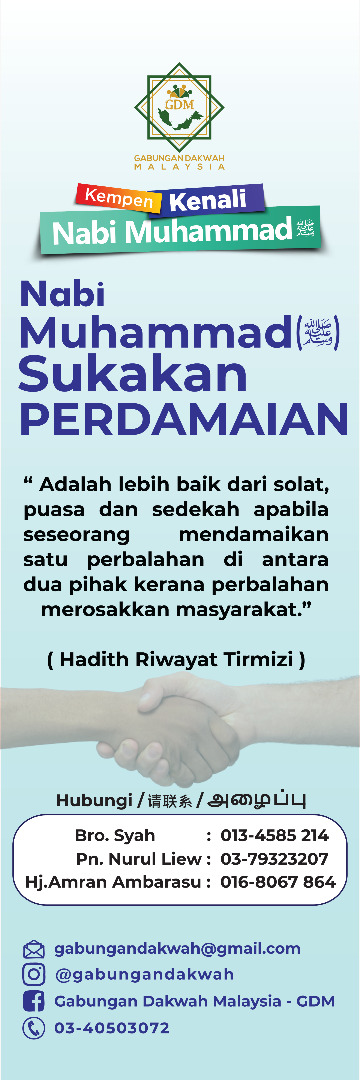Who is Muhammad (peace be upon him)?
Muslims believe that Muhammad (peace be upon him) is the final Prophet in a long chain of Prophets sent to call the people to the obedience and worship of God alone (‘Allah’ in Arabic). Some of these Prophets include Adam, Noah, Abraham, Ishmael, Isaac, Jacob, Joseph, Moses, David, Solomon and Jesus (peace be upon them all).
Just as Moses (peace be upon him) was sent with the Torah (the original uncorrupted revelation sent to Moses) and Jesus (peace be upon him) with the Gospel (the original, uncorrupted revelation – not the present-day versions), Muslims believe that Muhammad (peace be upon him) was sent with the Qur’an to demonstrate how its teachings should be applied.
The Prophet’s (peace be upon him) wife, ‘A’isha, was once asked to describe the Prophet (peace be upon him), and she replied that “his character was a reflection of the Quran” (Muslim, 40), meaning he meticulously implemented the noble teachings of the Qur’an into his daily life. We will demonstrate how he translated these noble teachings into noble actions.
Mission of Mercy
- “And We (God) have not sent you (Muhammad) except as a mercy for mankind.” Qur’an 21:107
As well as calling people to pray, fast and give charity, the Prophet (peace be upon him) taught that one’s faith in God should also affect one’s treatment of others. He said: “The best of you are they who have the best character.”
Many sayings of the Prophet (peace be upon him) emphasise the relationship between belief and action, for example: “Whoever believes in Allah and the Last Day, should not hurt his neighbour, and whoever believes in Allah and the Last Day, should serve his guest generously, and whoever believes in Allah and the Last Day, should speak what is good or keep quiet.”
The final Messenger (Peace be upon him) taught humans to show mercy and to respect each other: “He who does not show mercy to others, will not be shown mercy.”
In another narration, some people requested the Prophet (peace be upon him) to invoke God to punish the disbelievers but he replied: “I have not been sent as one to curse but as a mercy.”
Forgiveness
- “Let them forgive and overlook: do you not wish that Allah should forgive you? For Allah is Oft-Forgiving, Most Merciful.” Qur’an 24:22
The Prophet (peace be upon him) was the most forgiving of all people and the kindest. If someone abused him, he would forgive him, and the harsher a person was, the more patient he would become. He was extremely lenient and forgiving, especially when he had the upper hand and the power to retaliate.
Muhammad (peace be upon him) was all for forgiveness and no amount of crime or aggression against him was too great to be forgiven by him. He was the best example of forgiveness and kindness, as mentioned in the following verse of the Qur’an: “Keep to forgiveness (O Muhammad), and enjoin kindness, and turn away from the ignorant.” (Al-Qur’an 7:199)
Equality
- “Indeed the most honoured of you in the sight of Allah is the most righteous of you.”Qur’an 49:13
In the following sayings of the Prophet (peace be upon him), he taught that all humans are equal in the sight of God:
“All humanity is from Adam and Adam is from clay. There is no superiority for an Arab over a non-Arab, nor for a black over a white; except through piety.”
“God does not judge you according to your appearance and your wealth, but He looks at your hearts and looks into your deeds.”
It is related that once a companion of the Prophet (peace be upon him) called another companion in an offensive way, “Son of a black woman!” The Prophet (peace be upon him), became angry and replied, “Do you condemn him because of the blackness of his mother? You still have within you traces of ignorance from the pre-Islamic period.”
Tolerance
- “Good deeds and evil deeds are not equal. Repel evil with what is best, then he with whom you had enmity shall become as a loyal friend.”Qur’an 41:34
“You should not do evil to those who do evil to you, but you should deal with them with forgiveness and kindness.” This is how the final Messenger of God (peace be upon him) reacted to personal attacks and abuse.
Islamic sources include a number of instances where the Prophet (peace be upon him) had the opportunity to take revenge upon those who wronged him, but refrained from doing so.
He taught man to exercise patience in the face of adversity: “The strong is not the one who overcomes people by his strength, but the strong is the one who controls himself while in anger.”
Practising patience and tolerance does not mean that a Muslim should be a passivist and not defend himself in case of attack. Prophet Mohammad (peace be upon him) stated that, “Do not wish to meet the enemy, but when you meet (face) the enemy, be patient (i.e. stand firm when facing the enemy).”
Gentleness
- “By the grace of Allah, you are gentle towards the people; if you had been harsh and hard-hearted, they would have dispersed from around you.”Qur’an 3:159
A companion who served Muhammad (peace be upon him) for ten years said that Muhammad (peace be upon him) was always gentle in his dealings with him. “When I did something, he never questioned my manner of doing it; and when I did not do something, he never questioned my failure to do it. He was the friendliest of all men.”
On one occasion, the wife of the Prophet (peace be upon him) reacted angrily after being insulted by a person.
The Prophet (peace be upon him) advised her: “Be gentle and calm, O ‘Aisha, as Allah likes gentleness in all affairs.”
He also said: “Show gentleness! For if gentleness is found in something, it beautifies it, and when it is taken out from anything, it makes it deficient.”
Humbleness
- “And the servants of The Most Gracious (God) are those who walk on the earth in humbleness, and when the ignorant address them, they say: ‘Peace.’ ”Qur’an 25:63
The Prophet (peace be upon him) used to prevent people from standing up for him out of respect. He used to sit wherever there was a place available in an assembly and never sought a prominent or elevated place. He never wore anything to distinguish himself from his companions or appear in higher rank than them. He used to mix with the poor and the needy; he used to sit with the elderly and support the widows. People who did not know him could not tell him apart from the rest of the crowd.
Addressing his companions, he said: “Allah has revealed to me, that you must be humble. No one should boast over one another, and no one should oppress another.”
Such was his humbleness that he was fearful of being worshipped, a privilege only befitting God:
“Do not exceed bounds in praising me as the Christians do in praising Jesus, Son of Mary. I am only the Lord’s servant; then call me the Servant of Allah and His Messenger.”
The Ideal Husband
- “And live with them (your spouses) in kindness.” Qur’an 4:19
Not only was he a devoted husband, he also encouraged his companions to follow his example: “The most perfect of the believers in faith are the best of them in morals. And the best among them are those who are best to their wives.”
The Ideal Example
What has preceded is only a glimpse of how Muhammad (peace be upon him) lived his life. The examples of kindness and mercy mentioned may come as a surprise to some people given the portrayal of Islam in the media and its constant misrepresentation.
It is important when trying to understand Islam that one goes directly to its sources: The Qur’an, and the sayings and actions of Prophet Muhammad (peace be upon him), and that anyone does not judge Islam based on the errant actions of a few Muslims.
Comments from Non-Muslims
Mahatma K Gandhi, a major political and spiritual leader of the Indian independence movement, remarked: “It was the rigid simplicity, the utter self-effacement of the Prophet, the scrupulous regard for his pledges, his intense devotion to his friends and followers, his intrepidity, his fearlessness, his absolute trust in God and in his own mission. These and not the sword carried everything before them and surmounted every obstacle.”
George Bernard Shaw, the British playwright, declared: “The world is in dire need of a man with the mind of Muhammad; religious people in the Middle Ages, due to their ignorance and prejudice, had pictured him in a very dark way as they used to consider him the enemy of Christianity. But after looking into the story of this man I found it to be an amazing and a miraculous one, and I came to the conclusion that he was never an enemy of Christianity, and must be called instead the saviour of humanity. In my opinion, if he was to be given control over the world today, he would solve our problems and secure the peace and happiness which the world is longing for.”
41 AKHLAK RASULULLAH SAW YANG PATUT KITA CUBA CONTOHI
- Baginda selalu diam.
- Berbicara ketika perlu.
- Perbicaraannya fasih , ringkas tetapi padat .
- Menghadapkan seluruh tubuhnya bila berbicara dengan seseorang.
- Hatinya selalu sedih (inginkan umat dalam kebaikan dan terlepas dari azab الله swt).
- Selalu menundukkan pandangan kerana tawaddu’.
- Berfikir terus-menerus.
- Menghargai nikmat sekecil apa pun tanpa memperlekehkannya.
- Tidak pernah mencela makanan. Apabila suka , Baginda akan makan. Jika tidak , ditinggalkannya tanpa mencelanya.
- Tidak pernah marah yang ada kaitan dengan urusan dunia.
- Marah bukan kerana nafsu .
- Apabila kebenaran dipermainkan , Baginda akan bangkit untuk berusaha mempertahankannya.
- Apabila marah Baginda akan memalingkan muka.
- Apabila suka Baginda akan memejamkan mata.
- Tidak pernah berkata kotor, berbuat keji dan melampaui batas.
- Tidak pernah berteriak-teriak di pasar.
- Tidak pernah membalas kejahatan dengan kejahatan. Malah Baginda memaafkan & berlapang dada .
- Tangan Baginda tidak pernah memukul selain untuk berjihad dijalan الله swt.
- Apabila menghadapi dua perkara Baginda memilih yang paling mudah selagi ia bukan dalam perkara ma’siat.
- Di rumah , Baginda adalah manusia biasa yang membasuh pakaian , memerah susu & membuat sendiri segala keperluan diri.
- Ketika duduk atau pun berdiri , Baginda selalu berzikir .
- Raut wajahnya selalu ceria , perangainya dapat dicontohi dengan mudah , lemah lembut & peramah.
- Tidak pernah bersikap keras dan bertindak kasar , berteriak-teriak , lebih-lebih lagi mencela orang lain.
- Tiga perkara yang dijauhi ; perselisihan , bongkak & segala yang tidak diperlukan.
- Tidak pernah mencela & memaki hamun orang lain.
- Tidak pernah mencungkil rahsia orang lain.
- Tidak pernah berbicara kecuali sesuatu yang menjanjikan pahala.
- Perbicaraannya memukau sesiapa pun yang mendengarnya lalu terpegun seolah-olah ada burung melintas di atas kepala mereka.
- Sesiapa yang melihat Baginda sepintas lalu akan merasa gerun & hormat terhadapnya.
- Sesiapa yang selalu bergaul & telah dekat mengenali Baginda, akan menyayanginya sepenuh jiwa raga.
- Baginda pasti memberi tempat kepada orang yang ingin duduk & tidak membezakan dikalangan mereka.
- Sesiapa yang meminta sesuatu , pasti dipenuhinya atau jika sebaliknya ditolak dengan tutur kata yang lemah lembut.
- Tangan Baginda selalu terbuka kepada sesiapa sahaja tanpa pilih kasih . Baginda adalah ayah bagi mereka semua .
- Dimanana pun Baginda berada , disitu terpancar cahaya ilmu , sikap malu & sabar serta amanah .
- Tidak ada yang berani meninggikan suara dihadapan Baginda kerana kewibawaan Baginda .
- Semua mengakui keutamaannya kerana ketaqwaannya ; menghormati orang tua , menyayangi yang kecil , mengutamakan orang yang ada hajat , menjaga keperluan & kebajikan orang asing.
- Tidak terus memotong percakapan orang lain. Jika ingin memotong , Baginda hentikan dahulu ataupun berdiri.
- Paling berlapang dada.
- Paling tepat dalam berbicara.
- Paling halus keperibadiannya.
- Paling ramah & beradab dalam pergaulan & muamalahnya.
(Dipetik daripada Biografi Lengkap Rasulullah SAW ;
oleh Dr Sayyid Muhammad bin Alawi Al Maliki)








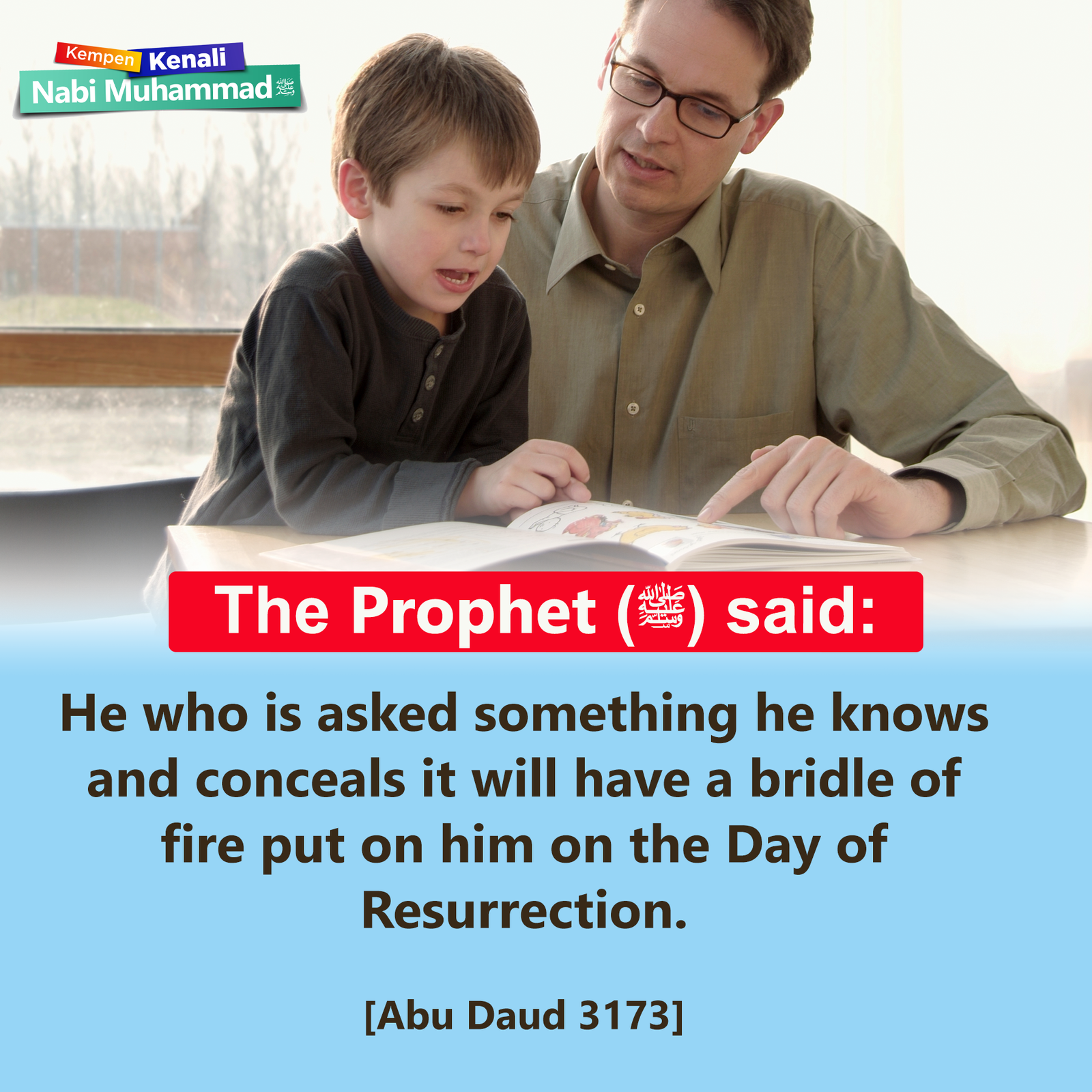

Muhammad Pocket Guide
Muhammad Pocket Guide is one of the most comprehensive and summarized pictorial books about the prophet of Islam Muhammad (peace be upon him). It provides a broad biography and summarized information about Muhammad such as his character and personal details. In addition, it provides a broad overview about his teachings and main events in his life.
by Osoul Global Center

